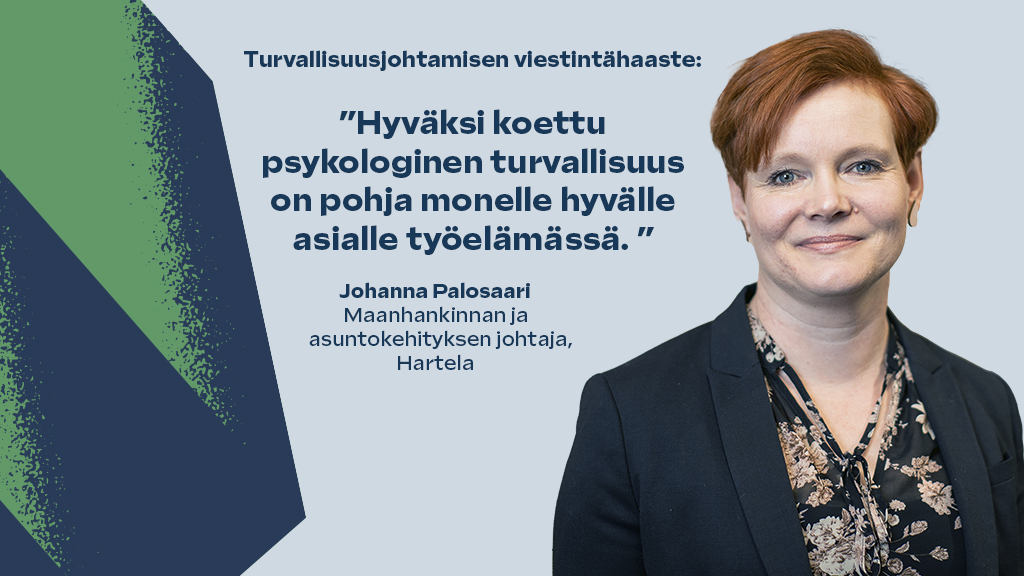Hartela's director of land acquisition and housing development Johanna Palosaare's blog post is the second in a series where company management representatives reflect on what makes a safe and prosperous construction industry. The articles are published on this page approximately every two weeks.

Psychological safety seems to be a buzzword these days. I'm glad that the topic is highlighted in today's working life discussions. However, it also often causes confusion. What exactly does that mean? What should I answer when asked if I feel that I work in a psychologically safe environment and how I myself can promote psychological safety?
I started thinking about psychological safety last year when I was doing the final thesis of my EMBA studies on the topic "Looking for change power!" – Humanity and emotions in managing change in the construction industry. In my opinion, the key words for psychological safety are group, appreciation, togetherness and courage.
When we talk about psychological safety, we talk about groups and the atmosphere and opportunities created by the group. Does the group create a safe space for its members to talk and express themselves? When you start thinking about this, it comes to mind what kind of effects psychological safety has on people's ability to work and motivation - and on the other hand, also on physical safety.
Perceived psychological safety is the basis for many good things in working life. A lack of psychological safety can, on the other hand, at worst lead to feelings of being outside and inferior, or to not daring to bring up difficult issues in the work community. For example, addressing occupational safety deficiencies requires that all members of the work community dare to speak up.
Openness without fear
Amy Edmondson, a pioneer in the study of psychological safety, has described ideas about psychological safety as follows: Psychological safety is the feeling that it is safe to act and express oneself in a group, without the risk of being embarrassed or belittled. Instead, openness is allowed and expected from members of a safe community. In a psychologically safe workplace, people feel they can speak openly, present ideas and ask questions. There you feel appreciation and no one's ability is questioned.
Several studies have shown that psychological safety increases motivation, well-being at work, commitment to work, performance, job satisfaction, cooperation and learning. The organization's ability to carry through changes increases. When people feel safe, they are able to openly express their opinions and feelings, innovate and come up with ideas without fear of embarrassment or failure.
What can I do?
Let's get back to the question of how I can promote psychological safety myself. It is interesting to put yourself in the position of an observer in various groups, which include and consider whether the group or groups are safe environments for their members:
- Is everyone participating in the conversation?
- How do people comment on each other's views or questions?
- Do we discuss things openly?
- Is every member of the group valued?
- Do we use the skills of others?
- Need help?
- Do we give feedback?
In the role of an observer, you can increase your own awareness of the group's activities and also evaluate yourself as a member of the group. When you make observations, you can see if some things should change so that a group of people feel safer and become stronger as a group. At the same time, you also learn to better understand why someone acts in a certain way in a certain situation.
Actively raising awareness and observation are good aids in developing psychological safety, because with them each of us can consciously start acting in a group in a way that contributes to answering the above questions with YES. I also strongly believe that "good goes around": When someone changes their communication, the effects are slowly reflected on others.
For help in the turmoil of changes
The world around us has been in turmoil in recent years, and the turmoil in our industry is currently very strong. What the future will bring - it's hard to predict. However, it is good for us to prepare for a constantly changing future instead of waiting for a return to a stable state.
When changes occur and operating methods are renewed, we are all involved. I see that groups and their functioning - or lack of functioning - have a strong connection with the ability to change and to increase it. Change always evokes emotions, and emotions are different and individual.
It is important to be able to deal with different emotions, and in order to be able to deal with them, one must dare to speak about the feelings out loud. Psychological safety is strongly connected to this speaking out loud. Everyone should dare to talk about their feelings and share their point of view on things without fear of being embarrassed or belittled. Let's appreciate and listen to each other!
PS Are you interested in reading more about it? I can warmly recommend Edmondson's book The Fearless Organization, also quoted in my text, or as a Finnish alternative, Nina Rinnee's book A brave organization. And this is not a commercial collaboration, but recommendations arise from sincere enthusiasm for the subject and good reading experiences.
Sources: Edmondson, A. 2019. The Fearless Organisation. U.S.
The challenge continues
RT's safety group ended up challenging people working in management positions in the construction industry to share their own vision and experience about why safety must be managed, by what means, and what good it brings. Through the challenge, we want to send a message to the entire construction industry that good management plays a decisive role in promoting occupational safety and well-being.
Hartela's director of land acquisition and housing development, Johanna Palosaari, was the second to take up the challenge, who will challenge next, according to Const.
Previous blog posts:
Write a comment